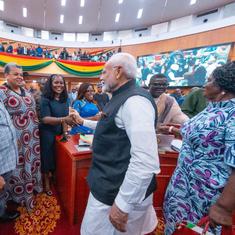The Madhya Pradesh High Court’s decision in January to quash the externment of Adivasi activist Antaram Awase has put the spotlight on the weaponisation of legal provisions historically used against marginalised groups – even though the unjust laws used to stigmatise these communities have long been struck down.
The externment order against Awase had been issued in 2024 under the MP Rajya Suraksha Adhiniyam, which aims to strengthen “the security of the state” and maintain “public order”.
But the ambiguous definition of “law and order” or “public order” can result in actions that violate the fundamental rights of individuals that the state perceives as dissenters required to be disciplined, especially if they belong to marginalised groups.
Awase’s case illustrates the firming up of a worrisome template.
In January 2024, Burhanpur district magistrate Bhavya Mittal passed an externment order to remove Awase from Burhanpur and neighbouring districts for one year. The order was upheld by the divisional commissioner. Awase, who hails from the Barela Adivasi community, is a member of the Jagrit Adivasi Dalit Sangathan, a collective of Dalit and Adivasi groups.
In externing Awase, the district magistrate relied on 11 pending offences registered under the Indian Forest Act and two cases registered under the Indian Penal Code.
In January 2025, the High Court struck down the order since Awase had not been convicted in any of the cases so far and the offences under the forest act were not part of the list of offences for which an externment order can be passed.
The court also held that the district magistrate’s action was in “excess” of her authority and “guided by extraneous consideration” and later fined her Rs 50,000.
Preventive framework
The powers of externment are governed by Sections 5 and 6 of the MP Rajya Suraksha Adhiniyam. Section 5 empowers the district magistrate to pass an externment order when there is reasonable ground to believe that the person is engaged in, or is about to engage in, offences against property, and persons, as specified in the Act.
Section 6 provides for the externment of those convicted for any of the offences specified in the MP Rajya Suraksha Adhiniyam. An externment proceeding is initiated on a report submitted by the police to the district magistrate based on the “criminal record” of an accused.
Generally, the state formulates rules to effectively implement the law and fill any gaps, providing a comprehensive framework of procedures to be followed.
But in the absence of rules, the MP Rajya Suraksha Adhiniyam does not provide guidance to the district magistrate or designated officer to exercise discretion in arriving at a decision to expel a person, accused or convicted in case, from a district and neighboring districts. For instance, a person accused or convicted of offences in Bhopal district could arbitrarily be externed from the neighbouring districts as well.
This gap confers excessive authority with unfettered discretion on the district administration, infringing upon the constitutional right to freedoms under Article 19 of the Constitution. This provision includes the right to free speech and expression, assembly and free movement throughout India.
Similarly, this gap affects the application of the principle of natural justice according to which an accused has the right to be heard and present witnesses and evidence. The thoughtless passing of template orders is routine in externment proceedings. This is similar to the manner in which preventive proceedings are conducted by the police under the Bharatiya Nagarik Suraksha Sanhita, 2023, which has replaced the Code of Criminal Procedure, 1973.
On several occasions, the Madhya Pradesh High Court has quashed externment orders passed by district magistrates for reasons including the lack of opportunity to cross examine the witnesses and the absence of independent evidence. In other cases it has said that orders have been passed without application of mind or are based on erroneous assumptions.
For instance, in 2018, the High Court in the case of Istfaq Mohd vs State of Madhya Pradesh held that it was an essential for the competent authority to grant the respondent an opportunity to be heard to pass an externment or detention order under the MP Rajya Suraksha Adhiniyam.
In Awase’s case, the court acknowledged that invoking Section 6 without him being convicted of any crimes and without recording the statements of witnesses showed that the district magistrate and the commissioner had passed the order in a “mechanical” manner.
This, it said, amounted to a “misuse of authority”.
Politics of externment
Externment proceedings are typically initiated against two groups: activists, journalists, members of political parties, and groups deemed “habitual offenders”. These proceedings are initiated en masse ahead of elections and major festivals, given their purported potential to disrupt law and order.
A report published in Article 14 cited data, obtained from the Madhya Pradesh Police Department, which showed that over 31,000 externment orders were passed between 2016 to 2023. In 2017, a total of 2,638 orders were issued – more than twice to 4,719 externment orders in 2018, ahead of the assembly elections in late 2018 and in the run up to the 2019 Lok Sabha elections.
A similar trend can be observed around the elections in late 2023 when the number of orders sharply surged to 7,319 from 4,282 in 2022.
Denotified tribes and other marginalised groups, stigmatised as “criminals by birth” by the Criminal Tribes Act, 1871, and subsequently deemed “habitual offenders”, have long borne the brunt of arbitrary externment orders. This continues even though the groups classified as “habitually criminal” were “denotified” with the repeal of the Criminal Tribes Act in 1952.
These marginalised groups are often booked for minor offences such as theft or criminal intimidation, which are punishable by less than seven years and for which arrest is not mandatory.
In Awase’s case the High Court was circumspect in its observation about “political pressure” being a driving factor for externment proceedings. The court requested the chief secretary to call for a meeting of all district magistrates in the state to support and direct them to not pass orders succumbing to political pressure. The court’s caveat is a wake up call to citizens to take cognisance of the gamut of instruments the state employs to achieve “prevention of crime” and maintain “law and order” .
Nikita Sonavane is a lawyer and co-founder of the Criminal Justice and Police Accountability Project (CPA Project). Deependra Sori is a law student.










